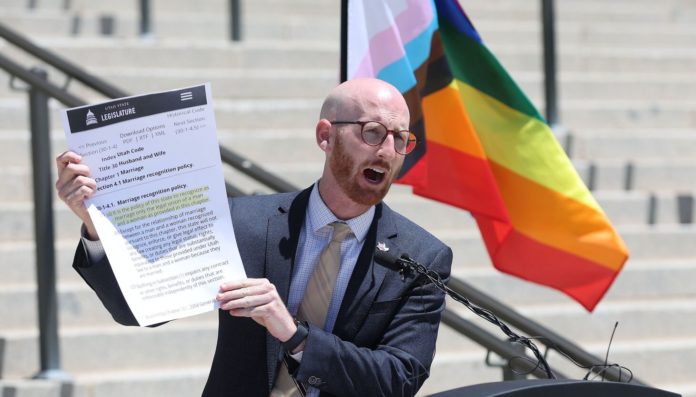
State Sen. Derek Kitchen unveiled legislation Tuesday to codify the right to marry in Utah after a recent leaked draft from the U.S. Supreme Court has many worried about rights to marry, use contraceptives and receive in vitro fertilization.
Kitchen, a Democrat from Salt Lake City, made the announcement in a press conference on the steps of the state Capitol building. He was joined by Jim Obergefell, the lead plaintiff in Obergefell v. Hodges, the landmark 2015 case that recognized the fundamental right to marry is guaranteed to same-sex couples under the 14th Amendment.
“We know that there is great unpredictability when our protections and civil liberties are granted via opinion by unelected bodies,” Kitchen said. “We cannot control what the Supreme Court will do. But state’s rights matter, and we can choose to make Utah a place for all families.”
Kitchen read directly from Utah state code, saying, “It is the policy of this state to recognize as marriage only the legal union of a man and a woman.” Although the Supreme Court ruled that states must recognize same-sex marriages, 29 states — including Utah — have what Kitchen called “trigger bans” in place which would go back into effect if the current court overturns the Obergefell decision.
“We need to protect the right to marry at the state level, because we don’t know what will happen at the federal level from the Supreme Court,” Obergefell told reporters on Tuesday. “We deserve to be treated equally. We deserve to be part of ‘we the people.’ . . . Think about this: Allowing the most fundamental relationship of any person’s life to allow that relationship to disappear, simply by virtue of crossing a state border.”
Same-sex marriage in Utah
Same-sex marriage is a personal issue to Kitchen, who was a plaintiff in the 2013 court case that helped Utah become the first state to recognize gay marriage after a federal ruling. In Kitchen v. Herbert, the court found Utah’s ban on same-sex marriage to be unconstitutional, citing previous rulings like Loving v. Virginia, which protected the right of interracial marriage.
Kitchen is the only openly gay member of the Utah Legislature.
“I go to work every single day with the firm understanding that I have a responsibility to protect and defend my community, this community, and that’s exactly what I’m doing today,” he said.
He said he is concerned to see recent attacks on LGBTQ individuals, especially the Legislature’s ban of transgender athletes from girls sports.
Obergefell urged Utah to enshrine the right in code, speaking of his own experience fighting for the right to marry. Obergefell was married to his partner, John Austin, on a chartered medical jet in Maryland, after Austin was diagnosed with Lou Gehrig’s disease.
“We could not get married in Ohio, so I had to take a dying man to another state in order to do something millions of others took for granted,” Obergefell said. “… That was all we wanted to do. We wanted to say ‘I do’ and at least have our federal government acknowledge our existence. … We had no plans to do anything else, other than say ‘husband’ a few hundred times every day.”
Even after their marriage, Ohio refused to recognize it, meaning Austin would have been listed as unmarried when he died, and his official records would not have listed Obergefell as the surviving spouse.
“Well, that was something John and I just were not willing to let go,” Obergefell said. “We said those words. We said, ‘I do.’ We made our promises to love, honor and protect each other. Our relationship, our marriage, deserves the same respect, dignity and protections as any other marriage.”
Austin died in 2013.
Obergefell urged Utah to pass Kitchen’s bill, saying it would protect families in the event that the Supreme Court decides to overturn its 2015 decision.
“I’m thrilled to be here today to add my voice to this call … to protect us so that my ability to call myself John’s widower doesn’t disappear if I had to cross state borders. So that two dads and their kids, they don’t have to worry what happens to their children when they cross the state border,” he said.
“Our families deserve nothing less,” Obergefell said, than the rights given to heterosexual couples and parents.
What’s next?
Even as a member of the minority party in Utah, Kitchen thinks his bill has a chance to pass. He hasn’t spoken with Senate GOP leadership about the bill, he said, but has brought it up to Republican colleagues.
“Utah is a family-friendly state,” he said. “We support families, we know how important it is to provide stable units for children to grow. We have already decided as a community that marriage equality is a value that we care about.”
The Supreme Court’s willingness to overturn abortion rights is worrisome, Kitchen said, because “when one fundamental right is under attack, all fundamental rights are under attack.”
In the leaked draft of a Supreme Court decision on Roe v. Wade, Justice Samuel Alito wrote, “Nothing in this opinion should be understood to cast doubt on precedents that do not concern abortion.”
Still, many are worried because they fear the draft could lead to overturning other rights that are similarly reasoned. Alito argued that the right to abortion isn’t in the Constitution, which The New York Times points out is also the case for contraception, gay intimacy and same-sex marriage, all rights acknowledged by Supreme Court decisions.
These “unenumerated” rights are based on the 14th Amendment, which declares: “Nor shall any state deprive any person of life, liberty, or property, without due process of law.”
Legal scholars say Alito’s arguments could allow the Supreme Court to overturn a series of rulings on LGBTQ rights, including gay marriage, “the right of gay spouses to government benefits … and even the right to gay sex,” writes The Independent.







